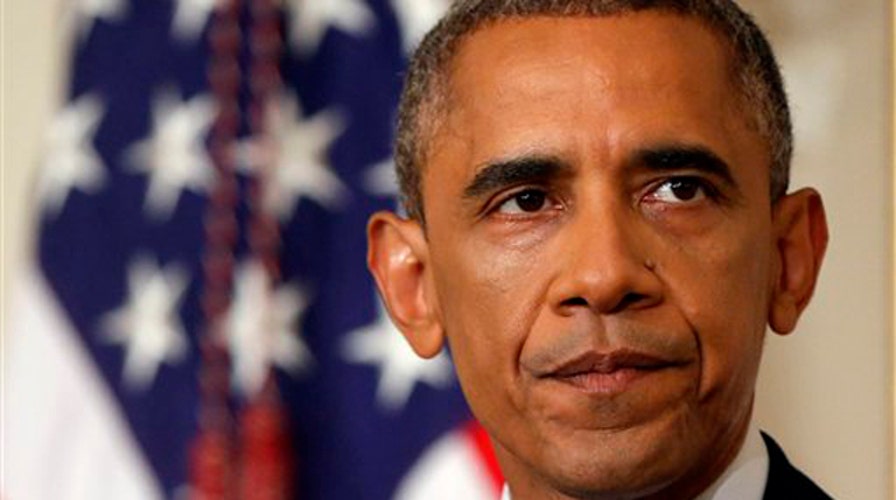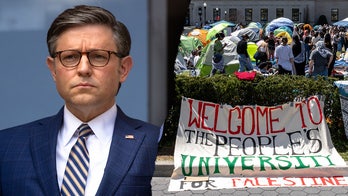President Obama delivers statement on US mission in Iraq
Obama: The United States will not be dragged into new Iraq war
President Obama announced Thursday night in a televised address that he has authorized the U.S. military to conduct airstrikes "if necessary" against Islamist militants in Iraq, and the military has conducted a mission to drop humanitarian aid there to help religious minorities stranded amid the violence.
Obama said in the statement from the White House the U.S. military is authorized to launch targeted airstrikes if Islamist militants advance toward American personnel in northern Iraq. Declaring that "America is coming to help," he also said that the U.S. decided to conduct the drops to the 50,000 or so religious minorities stranded on a mountaintop in the country's north, who have been forced to flee their homes as the militants advanced.
Obama said the religious minorities are under the threat of genocide from militants from the Islamic State (IS), the group formerly known as ISIS, and are stranded on the mountain without food or water. He said airstrikes could also be used to help protect those civilians.
The Yazidis, who follow an ancient religion with ties to Zoroastrianism, fled their homes after the issued an ultimatum to convert to Islam, pay a religious fine, flee their homes or face death.
"Earlier this week, one Iraqi in the area cried to the world, `There is no one coming to help.' Well, today, America is coming to help," Obama said. "We're also consulting with other countries -- and the United Nations -- who have called for action to address this humanitarian crisis."
The announcements reflected the deepest American engagement in Iraq since U.S. troops withdrew in late 2011 after nearly a decade of war. Obama has staked much of his legacy as president on ending what he once called the "dumb war" in Iraq.
Obama acknowledged that the prospect of a new round of U.S. military action would be a cause for concern among many Americans. He vowed anew not to put American combat troops back on the ground in Iraq and said there was no U.S. military solution to the crisis.
"As commander in chief, I will not allow the United States to be dragged into fighting another war in Iraq," Obama said.
Even so, he outlined a rationale for airstrikes if the Islamic State militants advance on American troops in the northern city of Irbil and the U.S. consulate there in the Kurdish region of Iraq. The troops were sent to Iraq earlier this year as part of the White House response to the extremist group's swift movement across the border with Syria and into Iraq. He also said he has authorized strikes "if necessary" to help Iraqi forces break the siege of the civilians on the mountain, and protect the people trapped there.
“The United States of America cannot turn a blind eye,” Obama said.
Both C-130 and C-17 cargo aircraft participated in the drop, escorted by F-18 fighters. All aircraft have since safely left the immediate airspace over the drop area.
The crisis in Iraq has escalated since IS seized control Thursday of the country's largest Christian city, Qaraqoush. The militants told its residents to leave, convert or die, which sent tens of thousands of civilians and Kurdish fighters fleeing from the area, according to several priests in northern Iraq.
Last week, IS also seized the northwestern town of Sinjar, forcing tens of thousands of people from the ancient Yazidi minority to flee into the mountains and the Kurdish region.
According to the U.N., between 35,000 and 50,000 fled to nearby Mount Sinjar and other areas, "reportedly surrounded by ISIS armed elements" and lacking water and other aid.
Earlier Thursday, the White House stopped short of committing America's military to stopping a potential "genocide" in Iraq, declining to say whether doing so is in "America's core interests."
White House Press Secretary Josh Earnest acknowledged the situation is nearing a "humanitarian catastrophe" and said Obama has demonstrated a willingness to use military force to protect America's core interests.
But when asked repeatedly by Fox News whether preventing a genocide counts as being in America's core interests, Earnest did not answer directly. Asked the same question twice more, Earnest responded that "each of these situations is evaluated on a case-by-case basis."
However, Obama later made clear in his remarks that the decision to authorize strikes is based in part on hoping to prevent a possible genocide.
Earnest and other administration officials nevertheless argue there is no American military solution to Iraq's problems and the country must seek a political solution.
The administration, along with the United Nations, is facing increasing pressure to get more involved to prevent the crisis from worsening.
The U.N. Security Council on Thursday condemned the attacks on minorities in Iraq and urged international support for the Iraqi government. The council said that the attacks could constitute crimes against humanity and that those responsible should be held accountable.
"The members of the Security Council also urge all parties to stop human rights violations and abuses and ensure humanitarian access and facilitate the delivery of assistance to those fleeing the violence," said Britain's U.N. Ambassador Mark Lyall Grant, who read from a statement after an emergency consultation requested by France.
The Associated Press contributed to this report.





